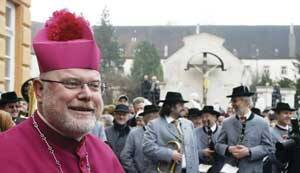German church leaders have criticized Chancellor Angela Merkel’s governing Christian Democratic Union for moving away from its Christian ethos. In an interview with the German newspaper Rheinische Post in late January, Bishop Gerhard Müller of Regensburg said having the word Christian in a name should mean “something concrete.”
“A party which stands for an unconditional defense of life and then begins to waver betrays itself and democracy. Humanity cannot be treated instrumentally—its dignity provides the frontier for political compromises,” he said. He added that such parties “should abandon the current opportunism—people will not vote for anyone who fails to uphold their own principles.”
Media analysts say the Christian Democratic Union’s new coalition with the Free Democratic Party has moved it to the left and risked alienating conservative supporters. A recent poll showed 4 percent of practicing Catholics had resigned their membership in the party. Within the Christian Democratic Union, a group calling itself the Working Group of Committed Catholics has formed to discuss how to maintain the party’s traditional Christian identity.
In January, Archbishop Reinhard Marx of Munich and Freising told the weekly Der Spiegel that the party’s tax policy had “proved beneficial above all for rich people,” adding that he also objected to its support for stem-cell research and aspects of its family policy. “What’s lacking for me is a decisive acknowledgment of the Christian faith and church—the C.D.U.’s program talks only very generally about Christian values, which is too hazy,” said Archbishop Marx, who heads the social action commission of the German bishops’ conference. “The C in Christian carries an obligation toward Jesus Christ. It is not just an adjective like liberal or social, whose meaning can be freely interpreted,” he said.
German government figures show Catholics make up 31 percent of Germany’s population of 82.3 million, compared with 30.8 percent who belong to the Evangelical Church in Germany, a federation of Lutheran, Reformed and United churches. About 2 percent of Germans are Orthodox.
In a pastoral letter before the September elections, the German bishops urged voters to back candidates who would uphold “the firm order of values found in our constitutional law and Catholic social teaching.” They said Catholics should support candidates who would defend life at all stages and maintain Germany’s social security system at a time when child poverty was “a scandal needing quick eradication.”








